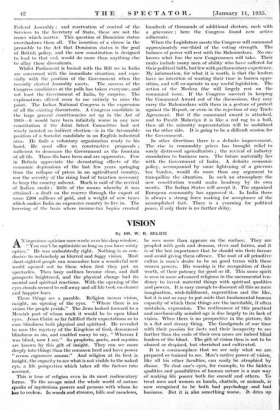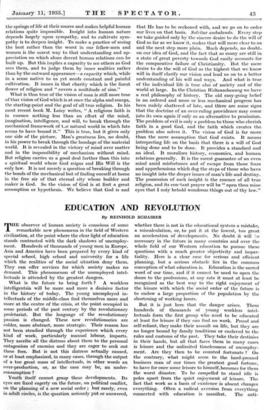VISION
By DR. W. B. SELBIE A N ingenious optician once wrote over his shop window,
A
"You can't be optimistic as long as you have misty optics." He was undoubtedly right. Nothing is so con- ducive to melancholy as blurred and foggy vision. Most short-sighted people can remember how a wonderful new world opened out to them when first they put on spectacles. Then hazy outlines became clear, and dull prospects brightened, and the physical change had its mental and spiritual reactions. With the opening of the eyes clouds seemed to roll away and all life took on clearer and happier hues.
These things are a parable. Religion means vision, insight, an opening of the eyes. " Where there is no vision the people perish." The Jews looked forward to a Messiah part of whose work it would be to open blind eyes. Jesus Christ so far fulfilled their expectations as to cure blindness both physical and spiritual. He revealed to men the mystery of the Kingdom of God, denounced blindness as sin, and enabled many to say, " Whereas I was blind, now I see." So prophets,- poets, and mystics are known by this gift of insight. They can see more deeply into things than the common herd and have power "rerunt cognoscere camas." And religion at its best is insight, the capacity to see what is not visible to the naked eye, a life perspective which takes all the factors into account.
This is true of religion even in its most rudimentary forms. To the savage mind the whole world of, nature speaks of mysterious powers and persons with whom he Las to reckon. In woods and streams, hills and meadows, he sees more than appears on the surface. They are peopled with gods and demons, elves and fairies, and it is of the last importance that he should win their, favour and avoid giving them offence. ;The-root of all primitive cultus is man's desire to be on good terms with these unseen powers. His worship is the recognition of their worth, of their potency for good or ill. This same spirit is seen in more advanced religions in the sacramental ten- dency to invest material things with spiritual qualities and powers. It is easy enough to discount all, this as mere imagination, wish-fulfilment, superstition and the like, but it is not so easy to put aside that fundamental human capacity of which these things are the inevitable, if often mistaken, expression. The restlessness of this practical and mechanically minded age is due largely to its lack of vision. When there is no perspective in the picture, life is a flat and dreary thing. The Gradgrinds of our time with their, passion for facts and their incapacity to see further than the ends of their own noses are indeed blind leaders of the blind. --The gift of,vision thenis not to be - abused or despised, but cherished and cultivated.
It is a commonplace that we see only what we are prepared or trained to see. Man's native, power of vision, like all his other faculties, can easily be atrophied by disuse. To shut one's eyes, for example, to the hidden qualities and possibilities of human nature is, a sure way of making life poorer both for oneself and others.. To treat men and women as hands, chattels, or animals, is now recognized to be both. bad psychology and bad business. But it is also something Worse, It dries up the springs of life at their source and makes helpful human relations quite impossible. Insight into human nature depends largely upon sympathy, and to cultivate sym- pathy is to deepen insight. To make a practice of seeing the best rather than the worst in our fellow-men and women is the surest way to that understanding and ap- preciation on which alone decent human relations can be built up. But this implies a capacity to see others as God sees them, and to judge them by inner realities rather than by the outward appearance—a capacity which, while in a sense native to us yet needs constant and painful cultivation. It issues in that charity which is the finest flower of religion and " covers a multitude of sins."
What is thus true of the vision of man is still more true of that vision of God which is at once the alpha and omega, the starting-point and the goal of all true religion. In his most recent book M. Loisy writes, " A religious faith is in essence nothing less than an effort of the mind, imagination, intelligence, and will, to break through the mechanical framework of tie natural world in which fate seems to have bound it." This is true, but it gives only one side of the picture. Man's greatness lies, no doubt, in his power to break through the bondage of the material world. It is revealed in the victory of mind over matter and in the impossibility of mechanism without mind. But religion carries us a good deal further than this into a spiritual world where God reigns and His Will is the only law. It is not merely a question of breaking through the bonds of the mechanical but of finding oneself at home in the free air of that eternal city whose builder and maker is God. So the vision of God is at first a great assumption or hypothesis. We believe that God is and that He has to be reckoned with, and we go on to order our lives on that basis. Solvitur ambulando. Every step we take guided only by the sincere desire to do the will of God so far as we know it, makes that will more clear to us and the next step more plain. Much depends, no doubt, on our idea of God, and the fact that so many are still in a state of great poverty towards God easily accounts for the comparative failure of Christianity. But the mere desire to do the will of God as the highest that we know will in itself clarify our vision and lead us on to a better understanding of his will and ways. And what is true of the individual life is true also of society and of the world at large. In the Christian Weltanschauung we have a real philosophy of history. The old easy-going belief in an ordered and more or less mechanical progress has been rudely shattered of late, and there are some signs that the doctrine of an over-ruling providence may come into its own again if only as an alternative to pessimism. The problem of evil is only a problem to those who cherish faith in a good God, and the faith which creates the. problem also solves it. The vision of God is far more than the mere assumption that God exists. It means interpreting life on the basis that there is a will of God being done and to be done. It provides a standard and an ideal. It moralizes history, economics, and human relations generally. It is the surest guarantee of an even mind amid misfortunes and of escape from those fears and apprehensions which dog the steps of those who have no insight into the deeper issues of man's life and destiny. The possession of such insight is the essence of all true religion, and its con-tant prayer will be " open thou mine eyes that I may behold wondrous things out of thy law."







































 Previous page
Previous page